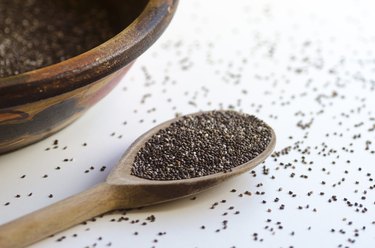
Ch-ch-ch-chia! Those little chia seeds are for more than growing Chia Pets. These ancient grains may have a place in a modern healthy diet, even, if not especially, if you have gastroesophageal reflux (GERD) — that is, if you eat the seeds wisely. Here's the scoop on chia seeds for acid reflux.
According to Julie Stefanski, RDN, LDN, a York, Pennsylvania-based registered dietitian nutritionist and spokesperson for the Academy of Nutrition and Dietetics: "If we look at the overall guidelines for managing GERD, chia seeds can fit into them quite well," though she notes she's not aware of any large human studies linking the use of chia seeds with helping GERD.
Video of the Day
Video of the Day
Fiber to the Rescue
When you have reflux, digestive juices go in the wrong direction: backing up the esophagus rather than digesting down. "This backup of stomach contents can often be aggravated by constipation," Stefanski says. Fiber can help with constipation — and chia seeds provide fiber, Stefanski says. Just 1 ounce provides about 10 grams of fiber, according to the USDA.
Fiber also makes you feel fuller, which can stop you from overeating, according to Johns Hopkins Medicine. When you overeat, your stomach remains extended, and it makes it harder for your stomach to digest all the food that's in it. If eating chia seeds (a fiber-rich food) helps you control your appetite and stop overeating, it may help you have GERD symptoms less frequently.
But if you're new to chia seeds, start small, Stefanski says. More fiber should be added into your diet gradually, starting with small amounts. "It's important to work your way up, starting with a teaspoon in yogurt for example, or some chia pudding," Stefanski says. And, she adds, like any high-fiber food, excess can lead to bloating and gas.
Read more: These 6 Chia Pudding Recipes Have Over 11 Grams of Protein and Practically Make Themselves
Chia for Fighting Inflammation
Inflammation can cause weight gain, and weight gain can exacerbate GERD, Stefanski says. In addition to fiber, chia seeds also contain several substances that support your body's efforts to fight inflammation, including omega-3 fatty acids and antioxidants myricetin and quercetin, she notes.
Another health benefit of chia seeds is how heart-healthy they are. According to the Academy of Nutrition and Dietetics, they have been shown to help lower cholesterol and blood pressure, which, when high, can be risk factors for heart disease.
Who Shouldn’t Eat Chia Seeds
If you've undergone fundoplication — a surgery that's done when the muscle at the end of your esophagus is too loose to keep gastric juices down — you'll want to avoid all seeds (including chia) while you're recovering, according to the University of Wisconsin (UW) Hospitals and Clinics Authority. This is one surgical treatment option for people with GERD.
After undergoing the surgery and before you see your doctor for your follow-up visit, you should only eat liquid foods. And if you make your own purees during this time, don't include any foods that have any seeds — chia or otherwise, UW Hospitals says.
How to Eat Chia Seeds
The Academy of Nutrition and Dietetics suggests eating chia seeds raw by sprinkling whole or ground chia seeds on your cereal, yogurt or vegetables.
Chia seeds absorb liquids easily, the Academy notes, so soaking them makes it easier to add them to cooked cereal and other dishes as a gelatin. Fun fact: Their sprouts are also edible and can be added to salads, sandwiches and other dishes.
But Stefanski cautions that if you have swallowing issues or narrowing of the esophagus, you should be sure you're well-hydrated before eating chia seeds. You may want to soak them first so that they expand, she says. (Chia seeds can absorb many times their weight in water.)
And general best practice says that if you have GERD, you don't want to eat any food, including chia seeds, too close to bedtime, as you don't want food sitting in your stomach. If you eat soon before you lay down, the food can back up and cause a burning-like pain in your esophagus, Stefanski says.
Read more: Be Careful With Chia Seeds
- University of Wisconsin Hospitals and Clinics Authority: “Diet After Fundoplication”
- Academy of Nutrition and Dietetics: “What Are Chia Seeds?”
- Julie Stefanski, MEd, RDN, CSSD, LDN, CDCES, FAND, registered dietitian nutritionist; spokesperson, Academy of Nutrition and Dietetics, York, Pennsylvania
- Johns Hopkins Medicine: “GERD Diet: Foods That Help With Acid Reflux (Heartburn)”
- USDA: FoodData Central “Seeds, Chia Seeds, Dried”
Is this an emergency? If you are experiencing serious medical symptoms, please see the National Library of Medicine’s list of signs you need emergency medical attention or call 911.